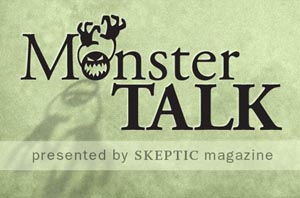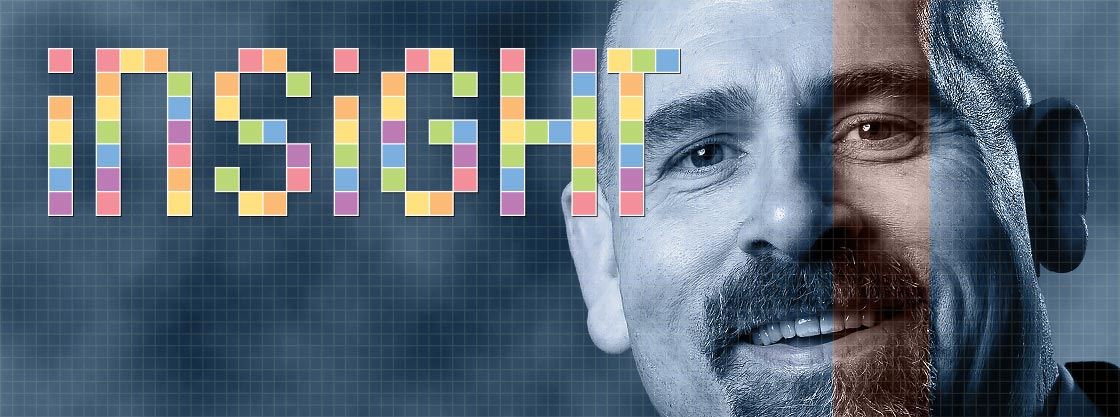
MonsterTalk is a free audio program about science and monsters, presented by Skeptic magazine. Discover our podcasts today!
A reader recently wrote in to Skeptic to complain about the inclusion of zombies in the content. I’m not 100% sure if this was directed at MonsterTalk, the podcast I produce, or at Skeptic itself because of an upcoming Skeptics Society lecture (scheduled for today at 2 pm at Caltech) about zombies and neuroscience by Bradley Voytek, one of the co-authors of Do Zombies Dream of Undead Sheep? I had both Bradley and his co-author Timothy Verstynen on a recent episode of my show.
The letter read, in part:
I cannot believe the attraction that zombies have for sane persons, especially skeptics. Please leave off all future discussions of such a childish, paranormal, boring subject matter.
I don’t work for Skeptic and wasn’t sure if the complaint was meant for me, for Bradley, or for Skeptic’s management? But I responded because it turns out I do have some strong feelings about the role of monsters and the paranormal in the skeptical world. What follows is a lightly edited version of my response to the author of this email:
I’d like to take a moment and respond in what I hope is a constructive manner.
I believe that many advances in scientific thinking have been derived from modeling scenarios that are impossible. Where would we be scientifically if Einstein hadn’t imagined trains traveling at the speed of light? Would we have reached the moon if we hadn’t first had science fiction imaging the feat? In Voytek’s book he is using the concept of zombie to explain real neurological science.
For many imaginative people, this kind of modeling is helpful to provide relevancy and emotional power to science which might otherwise be seen as too difficult or esoteric. Why would it be prudent to eschew any helpful mode of science communication on the premise that it might not have 100% audience approval?
Doesn’t the very form of communication provided through the Skeptic network allow the reader to determine from the headlines and summaries whether or not they wish to continue reading the articles? I personally am biased in favor of the use of the impossible as a topical springboard to talk about the possible and probable, but even if I were not, I wouldn’t advocate a slavish devotion to literalism.
Surely metaphor has its place, perhaps in the very heart of consciousness? I have strong reasons to suspect that narrative itself is a product of our neural evolution and can’t imagine (literally) what it would be like to think outside of the framework of story. So I’d politely suggest that the purpose of Skeptic is to advance scientific reality, but that pretending cultural zeitgeist doesn’t exist isn’t progress—it’s putting on blinders.
Just as with MonsterTalk, the views expressed here represent my own views and not necessarily the views of Skeptic magazine or the Skeptics Society, but it is my sincere hope that the inclusion of material you don’t care for will not result in your being unable to enjoy the many other fine contributions that regularly make up an issue of Skeptic or eSkeptic (or INSIGHT).
I don’t know if you’ve actually listened to an episode of the show or not, but I think you’d find that if you did it is often full of very thought provoking science. At any rate, the show is both free and optional so if it doesn’t suit your taste please let me assure you that based on my experiences it has helped many people sleep better after learning that many of the things they feared were baseless. And more than one now self-identifying skeptic has thanked me for introducing them to this mode of thinking.
I don’t begrudge those who have no interest in the paranormal, the supernatural, the mysterious, etc. I do, however, think the world is richer with those imaginative modes of thinking out there. My goal is to provide useful information for people on how to determine if such claims are true, not to eradicate such ideas from the Earth. To that end, I hope to continue to produce MonsterTalk for some time.
In examining beliefs that many dismiss as minor or inconsequential, we might have an opportunity to examine the idea of belief itself without some of the adversarial risks that accompany more widespread and entrenched beliefs. But make no mistake about the seriousness with which many take ideas such as monsters. I’ve said it before but it bears repeating: In the world of cryptozoology you see the entirety of belief writ small. The spectrum of all the ways one might encounter belief are contained neatly in this field for those with time to study it: disinterest, mild interest, ferverous intensity, religious zeal, obsession, fascination, dismissal and disdain. From people who jump up and down adamantly denying the existence of bigfoot, to people who pray to bigfoot as an earth spirit—it is all there. If you want to study belief with a slightly reduced risk of getting involved in a holy war, this is a field worth investigating.
But, as Voytek and Verstynen have noticed (along with many other authors and researchers we’ve talked with on MonsterTalk) the monster is an excellent framework for science demonstration. This will be etymologically familiar to frequent listeners to the show.
I haven’t heard back from our anonymous complainer, but I hope that s/he will think about my response before dismissing this modality of science communication.











Beautifully stated Blake!
It’s not that I have not felt the same about some subject – the first discussion of creationism is interesting, by by the 100th it becomes a little tiresome. Then someone comes up with a new take on an old subject, say the psychology of belief and we have an interesting conversation again!
I am very glad you took a constructive approach. Our colleague has a different opinion, but is deserving of respect even during disagreement. You may yet persuade him that this is interesting and worthy of your (uncompensated by him) time and effort.
Finally, thanks for a great podcast. Most of the monsters are familiar, a very few are new to me, but there is always a nugget worthy of consideration. Keep up the good work.
I’m glad you enjoy it. I’ve tried to make this October a real treat.
Well said.
Thanks!
Here is a REAL MONSTER(TM) for you
http://spaceweathergallery.com/indiv_upload.php?upload_id=103395
Ha – it took me a minute to spot it.
“I cannot believe the attraction that zombies have for sane persons, especially skeptics. ”
Yet the attraction is there. During Edinburgh Fringe Festival I was at event where zombie theme was used to teach basic epidemiology. http://www.zombiescience.co.uk/ It was great.
Is Zombola only transmitted through direct contact with bodily fluids?
That looks pretty nifty. Wish I could’ve attended.